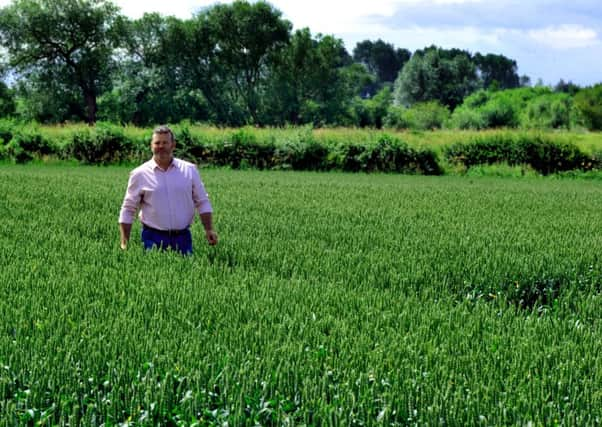Farm of the Week: Farmer by the Ouse says the hard work begins now


Richard runs an arable enterprise of around 500 acres with his father, also Richard, from their base at Manor Farm, Kelfield beside the River Ouse growing milling wheat, malting barley, potatoes, industrial hemp and sugar beet.
Richard is vice chairman of the combinable crops board for NFU North East and sits on the National Environment Forum and the Red Tractor board. He is chairman of the Campaign for the Farmed Environment in East Yorkshire and works with a number of northern universities. He sees all of this work as vital to farming’s prosperity.
Advertisement
Hide AdAdvertisement
Hide Ad“If farmers don’t get involved we don’t get to steer progression. My hope is that by being involved first hand in research, management and development of the environment and farming methods we can build a better future.
“I voted to ‘remain’. I think the EU is very flawed but had some sensible thinking although implementation over 28 countries often made a mess of things. There were times when I believe the additional bureaucracy was down to our own government’s interpretation of the EU’s directives.
“I don’t have the confidence that our government has the wherewithal to listen to what is needed and deliver what farmers need so that we can get on with the business of farming and managing the environment.”
Richard’s opinion on the shape of any new British governmental system for agriculture is that there should be no support for food production, greater assistance on farmers’ roles as ‘guardians of the countryside’ and a more enlightened attitude to ensuring that better prices are paid for food.
Advertisement
Hide AdAdvertisement
Hide Ad“Food produce is what I can grow and sell. If it doesn’t make me money I can grow and sell something else or do something different.
“What I can’t sell is something like a hedgerow so it makes sense to pay me for that, maintaining it so that the countryside is looked after. That’s just one instance, there are countless more.
“Underpinning all of this should be a government that works harder with retailers, just as much as we as farmers are trying.
“What retailers generally fail to recognise is that as you gradually devalue food on the farm by dragging down the price paid for commodities the effects on those they are squeezing lead them to purely thinking short term.
Advertisement
Hide AdAdvertisement
Hide Ad“Investment in the landscape, soil fertility, adoption of new technology and enhancement of sustainability in production just can’t be done. Farmers are all driven by what they have to work with.
“One good friend I’ve known for years grows cauliflowers in Kent. Last winter he was rotovating them back into the ground while half a mile up the road a major supermarket was importing them from Spain. That’s just one story, there are many more.
“If those who voted ‘leave’ stand by British food as much as they say they want Britain to be great again then that will help.
“Of course there are complexities over world trade rules and protectionism but there’s nothing to stop a British public voting with its British feet for British produce.
Advertisement
Hide AdAdvertisement
Hide Ad“What I really want to see is a greater understanding over proper valuation of what we produce here. I know the square metre of grain that I grow will produce enough flour for a loaf of bread. I also know that it is competing on a world market with something from the Ukraine or Argentina where they may have a completely different approach and set of rules to growing that flour. That’s not right and needs to be addressed.
“Stewardship schemes run through the EU were fantastic. They rewarded farmers for undertaking stewardship work and it caused a sea-change over how farmers viewed environmental management.
“Sadly the new ‘greening’ measures that began being implemented last year was in danger of reversing that trend with many farms disillusioned by the new arrangements.
“The British government now has the opportunity to set things right for farmers. I hope they listen and act in favour of everyone from farmer to food purchaser because that way we can move forward together.”
Advertisement
Hide AdAdvertisement
Hide AdRichard and his father won the Tye Trophy for their environmental commitments in 2014.
One-third of his farming acreage was under 12ft of water in January and he lost 60 acres of winter wheat and 30 acres of oilseed rape, his whole crop of oilseed rape.
His harvest cropping started last weekend and will include just over 100 acres of winter wheat growing the varieties Crusoe and Trinity; 66 acres of Mulika spring wheat; 40-plus acres of Concerto spring barley, just over 60 acres of Venture winter barley, 40 acres of hemp for Harrison Spinks beds; 92 acres of potatoes for Walkers; and 65 acres of sugar beet.
Richard is married to Brigita and they have three children Cianna, 21, Liam, 19, and Niamh, 17. Richard and Brigita also run an award winning holiday accommodation business called Dovecote Barns.